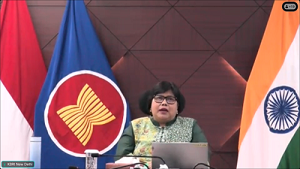On 11 December, the VIF in collaboration with Habibie Centre, Indonesia organised a RoundTable Discussion (RTD) on "Indo-Indonesian Geopolitics: Navigating Growth Amidst Global Challenges". Dr Arvind Gupta, Director VIF, welcomed the speakers and gave the introductory remarks followed by Dr Mohammad Hasan Ansori, Executive Director, The Habibie Center. HE Ina Krishnamurti, Ambassador of the Republic of Indonesia, New Delhi and HE Sandeep Chakravorty, Ambassador of the Republic of India, Jakarta gave special remarks on the Indonesia-India relations. The RTD involved presentations by Prof Dr Dewi Fortuna Anwar, Chairperson and Board of Directors, The Habibie Center; Prof Sachin Chaturvedi, Director General, RIS; and Dr Udai Bhanu Singh, Former Senior Research Associate, IDSA, which was followed by inputs from Mr Satish Mishra, Former MD, Strategic Asia and Dr Gautam Jha, Asst Prof, Center for Chinese and SE Asian Studies, JNU.
India and Indonesia, as close neighbours share deep historical and cultural connections. Despite past challenges, relations have strengthened, particularly through India's Look East and Act East Policies in the 1990s. In 2024, India and Indonesia will celebrate 75 years of anniversary and the partnership has evolved since their fight against colonial powers, and has matured into a significant driving force in the Asian Century. In 2018, the bilateral relationship was elevated to a Comprehensive Strategic Partnership during Prime Minister Modi's visit to Indonesia.
The discussion emphasised that both nations have built up economic ties. Initiatives like India's Atma Nirbhar Bharat and Indonesia's Make in Indonesia, focused on promoting the manufacturing sector offer various economic opportunities. The inauguration of a direct flight between New Delhi and Bali symbolises these efforts. Indonesia wants to be middle income by 2045 and India is in its phase of Amrit Kaal till 2047, thereby sharing common economic postures. The shared economic postures of both the countries, along with common foreign policy stances of strategic autonomy, indicate a balanced power dynamic.
As strategic partners, India and Indonesia have engaged in high-level exchanges and strategic dialogues, experiencing strong growth and regional cooperation on global issues. India took the G20 presidency after Indonesia in 2023 and this shows how the countries of the south are gaining importance. The solidarity and spirit of the 1950s which helped in leading the non-aligned movement is getting revived by both Indonesia and India. Indonesia through its outlook for ASEAN in the Indo-Pacific and India through its G20 theme on Vasudev kutumbakam showed the world about the solidarity of the global South.
Despite global geopolitical challenges and the dysfunctional nature of multilateral organisations, both countries are positioned for growth. Economic projections for India and Indonesia indicate substantial growth, and their demographic dividends present collaborative opportunities. Bilateral trade has surged, reaching USD 38 billion in FY 2023, with a goal of achieving USD 50 billion by 2025. The discussion highlighted areas for collaboration, including the energy sector, the digital economy, human resources development, and shared value systems.
Apart from India-Indonesia relations, the discussion focussed on the issues surrounding Indo-Pacific and geopolitical landscape. The first major challenge that the Indo-Pacific faces is the rise of China. China uses its economic power and statecraft i.e. BRI and AIIB provide opportunities but also form part of China’s assertive foreign policy and use of military force to assert claims. Another issue in the Indo-Pacific is the unavoidable rivalry between the US and China. And then there are conventional and non-conventional security challenges that the Indo-Pacific region faces. Finally, the major issue is the Indo-Pacific discourse as there are contending visions for the region. The geographic boundaries of the Indo-Pacific are not clearly defined. The discussion also focussed on the emergence of several Indo-Pacific strategies and initiatives. The discussion questioned ASEAN centrality given challenges from China and the situation in Myanmar.
The discussion concluded that India and Indonesia are maritime neighbours. They are vibrant democracies, with both going for elections next year, and a lot needs to be done to maintain and enhance the close strategic ties between the two. As we are living in a polarised world with cross cutting challenges, the two countries need to collaborate on various fronts. The Indian Ocean region should be an area of cooperation and not confrontation. It is essential for both sides to ensure regional peace, stability and prosperity by mitigating risks and maximising potential benefits prudently, with a special focus on cooperation in the blue economy and governance.







Post new comment